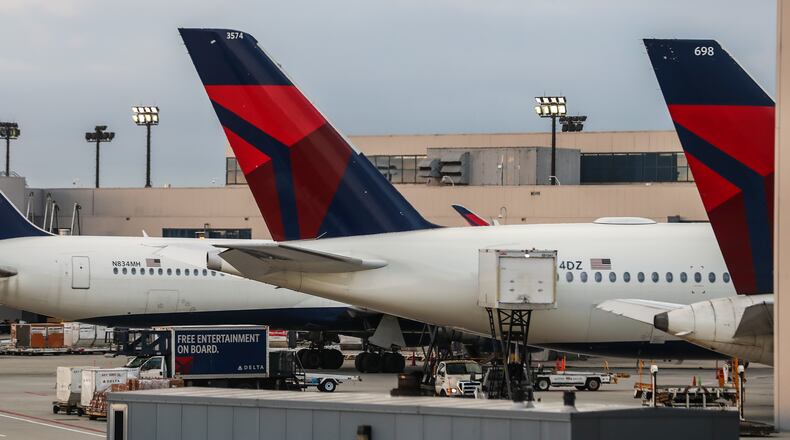As demand for air travel soars, Atlanta-based Delta Air Lines is seeing people take to the skies with new travel patterns coming out of the pandemic.
Huge volumes of passengers are putting pressure on the aviation system and prompting Delta to spend millions to increase pilot pay and staffing — with the company taking a hit to its financial results in the first quarter despite record revenue.
It’s part of the price the airline is paying to gear up for record demand this year. But it won’t be simply a return to pre-pandemic flight activity. Delta is also adjusting to an array of shifts in how people fly.
“Throughout the recovery, travel behaviors and patterns continue to evolve,” said Delta President Glen Hauenstein during an investor call on Thursday.
People who built up savings during the pandemic are now more likely to splurge on vacations with premium seats in first class, business class or extra legroom. That’s prompting the airline to add more premium cabins to its fleet, even though domestic corporate travel is only about 85% recovered.
Travelers are also booking flights earlier, since most change fees have been discontinued. And hybrid workplaces are “blurring the lines between business and leisure trips,” Hauenstein said. “That’s really what we’re trying to harness here.”
Business travelers are less likely to take one-day road warrior trips, and are more often combining multiple meetings into one trip, adding on a stay for leisure — or working while away from home.
Travel demand from New York to Florida “has never been bigger,” Hauenstein said “People have decided that they can live in Florida and work in New York.”
With the strong demand and travelers paying more for flights and premium seats, Delta brought in $12.8 billion in revenue in the first quarter of the year, up 36% from the first three months of last year.
But the company still reported a quarterly net loss of $363 million, a smaller loss than the first quarter of last year, after making one-time payouts to pilots, who had not gotten a raise in more than three years.
The bonuses to pilots amounted to $735 million and came from a new contract that assured the airline would not endure a potentially devastating strike.
The pilots received a one-time payment equivalent to 14% of their pay last year plus 4% of their pay for each of the previous two years. They also got an initial pay raise of 18% with the new contract.
“We wanted to ensure that we have the very best contract to attract the very best pilots in this industry to come work for Delta,” said Delta CEO Ed Bastian in an interview with The Atlanta Journal-Constitution.
The company’s loss for the January-March 2023 quarter was about 62% narrower than its $940 million loss in the first three months of 2022. The first quarter of the year is the slowest season of the year for airlines like Delta.
The airline’s operating expense increased 29% to $13 billion, including a 20% increase in payroll after hiring thousands of new employees and hiking pay across the company.
Despite concerns about economic uncertainty this year, Bastian said sales are strong. Delta has seen record advance bookings and recently had its 10 highest sales days in the company’s history.
“That portends very, very well for the strong spring and summer travel season,” Bastian said.
But the strong demand also brings challenges. Airlines and the entire aviation industry are coping with limited staffing and struggling to keep up with the onslaught of passengers.
Credit: JOHN SPINK / AJC
Credit: JOHN SPINK / AJC
Bastian had previously hoped for Delta’s flight capacity to be fully restored to pre-pandemic levels this summer, but said the airline has cut some flights from its schedule “to make sure that we’re able to reliably manage the summer.” That echoes similar challenges Delta dealt with last summer.
“Aviation infrastructure is still fragile,” Bastian said. The airline saw storm-driven flight cancellations drive down its flight capacity in the first quarter.
Now, it’s more likely that Delta’s flight capacity will be fully restored towards the end of this year, he said.
Delta and other airlines have also reduced flight schedules into airports in New York and Washington, D.C., after the Federal Aviation Administration warned of air traffic controller shortages in those areas. Bastian said Delta was pleased to make the adjustments because it “would otherwise be in very difficult shape for the summer.”
Strong demand for travel combined with limited airline flights often results in crowded planes and high fares. Delta’s planes averaged 81% full in the first quarter, up from 75% a year earlier.
The airline’s passenger revenue per available seat mile, a measure of how much customers pay for airline tickets, was up 27% in the first quarter compared with a year ago. Growth in sales of premium seats like first class, business class and Comfort+ seats with extra legroom is outpacing sales of regular seats in the main cabin.
Bastian said every new plane Delta gets delivered has about 1/3 of the seats in premium cabins, because those are the areas of highest growth in demand.
He said the revenue increases the airline has seen show that consumers want “to be able to get the best product available, and they’re willing to pay for it.”
Delta by the numbers
In the January-March 2023 quarter, Delta reported:
Operating revenue: $12.8 billion, up 36% year-over-year
Operating expense: $13 billion, up 29% year-over-year
Passenger traffic (in revenue passenger miles): Up 28% year-over-year
Source: Delta
About the Author
The Latest
Featured



